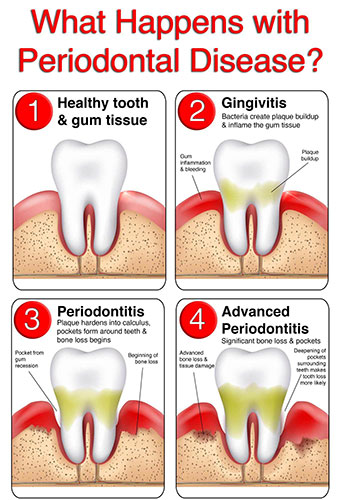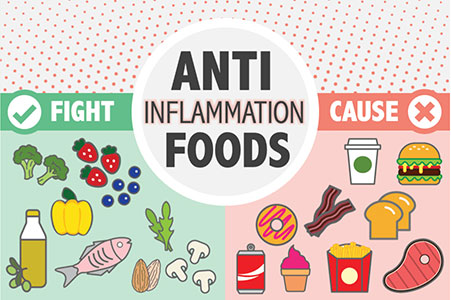Note: The definitions of terms marked in (*) are in the glossary at the end of this article.
Inflammation(*) is a key player in every illness – including gingivitis and periodontal disease. A deficit in fiber intake can lead to inflammation. But unfortunately, 95% of North Americans don’t eat enough fiber. As a result, the bodies of these individuals may not be making enough “short-chain fatty acids(*)”. We will go over why this is important in this article.

Researchers have found irrefutable scientific evidence that nutrients(*) modulate inflammation in our bodies. What our patients consume either boosts inflammation or turns it down. Various healthy foods lower inflammation, slow aging, support a healthy metabolic rate(*) and promote overall health.
Theories about nutrition have changed over the years. In the 1980s, eggs were considered “bad” due to their cholesterol content. We now know that 80% of the body’s cholesterol is from what the liver makes – not from the diet. In the ’80s, educators told us in school, fat was bad. However, it turns out our diet needs some saturated fat. We need monosaturated fats for their anti-inflammatory effect, and fats are essential for brain health.
In the 1980’s we said carbohydrates were great; now we know processed carbohydrates aren’t so good.

Two thousand three hundred years ago, in 300BC, Hypocrites(*) said all disease begins in the gut. Therefore, he said, “let food be medicine and medicine be food”. He had no microscope or food pyramid to help him, but he understood food was essential for optimal living. It’s uncanny how Hypocrites knew the importance of gut health to the immune system.

In 2020 the National Institute for Health finished the first phase of the microbiome project(*). It concluded the gut was a powerful organ and its flora overwhelmingly impacts overall body health. And foods that are good for the body are also good for your dental health. Most of the gut flora is in the large intestine, fermenting(*) the gut fibers (insoluble and soluble) to make short-chain fatty acids, which are the body’s most potent anti-inflammatory agent. Any time the body can make more short-chain fatty acids, it helps the body move toward healing.
Immunologists and microbiologists have shown a primordial relationship between fiber(*) and our body. Given this, St. Lawrence Dentistry recommends making sure you have adequate fiber intake – to reduce the inflammation in the mouth and body as a whole.

In addition to fiber, your ability to chew food is pivotal in your overall health. Anytime you improve chewing function, you can improve digestion. And when you have better digestion, you will also have better absorption – which means you can heal better and grow stronger.

There is no better time to start taking care of yourself than when you are in the “eye of the storm”. If you are overweight and stressed, comfort foods will drag you further. You need high-fiber and nutrient foods like salads and apples and to eat an apple, you need strong teeth. Solid dental work can restore your teeth to increase your chewing function.

At St. Lawrence Dentistry, we talk a lot about chewing function, digestion, the absorption of nutrients, and the reparative process. Patients often pay attention more when we mention how this can slow down aging. We try to engage patients in taking care of their bodies so real changes can happen to their dental and overall health. Dentistry can mean improving chewing function, allowing more nutrient absorption.
Glossary of Terms:
- Inflammation: A localized physical condition in which part of the body becomes swollen, reddened, hot, and often painful, especially as a reaction to injury or infection.
- Short-chain fatty acids (SCFAs): Are the primary metabolites made by the microbiota in the large intestine via the anaerobic fermentation of indigestible carbohydrates such as dietary fiber.
- Nutrients: a substance that delivers nourishment critical for growth and the maintenance of life.
- Metabolism: the chemical changes in a cell that produce the energy needed for organisms to grow, reproduce and remain healthy.
- Hippocrates: A Medical practitioner considered the father of medicine; writer of the Hippocratic oath.
- Human Microbiome Project (HMP): A research initiative to enhance understanding microbiota in human health and disease.
- Gut fermentation: A regular phenomenon involving the metabolism of some carbohydrates to short-chain fatty acids.
- Carbohydrates: A class of organic compounds occurring in foods and living tissues, including starch, sugars, and cellulose. They have hydrogen and oxygen in the same ratio as water (2:1) and generally break down to liberate energy in the animal body.
- Sugars: A sweet crystalline substance from various plants, mainly sugar cane and sugar beet, consisting of sucrose and used as a sweetener in meals and drinks.
- Starch: An odorless, tasteless white compound existing widely in plant tissue and obtained chiefly from cereals and potatoes. It is a polysaccharide that functions as a carbohydrate store and is a vital component of the human diet.
- Fiber: A dietary material (a carbohydrate), including substances like cellulose, lignin, and pectin, that are immune to the action of digestive enzymes.
- Cellulose: an insoluble substance that is the primary constituent of plant cell walls.
- Lignin: a fiber that forms key structural materials in the support tissues of most plants.
- Pectin: A fiber found in fruits.
Reference:
Nutrition Plays an Essential Role in Your Patients’ Health and Your Clinical Outcomes, Dr. Uche Odiatu, Viva Learning 2021
- St. Lawrence Dentistry Looks Forward To St. Patrick’s Day! - March 12, 2025
- Understanding Dental X-Rays and Radiation: What You Should Know - January 13, 2025
- Happy New Year from St. Lawrence Dentistry! - December 30, 2024










